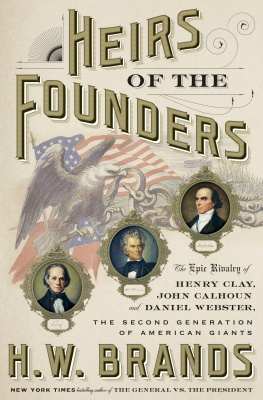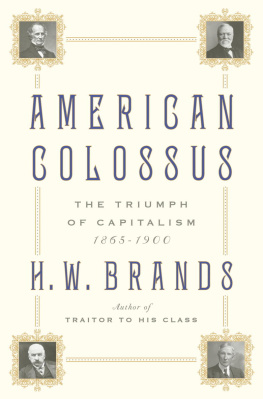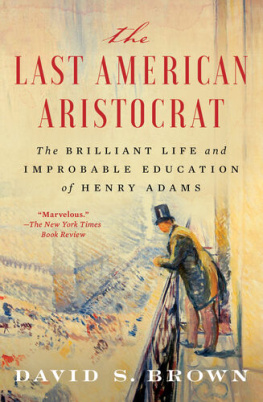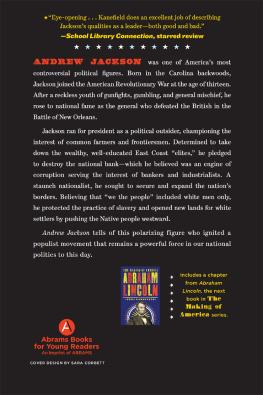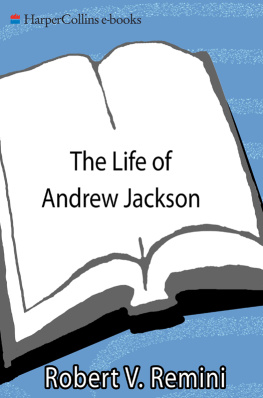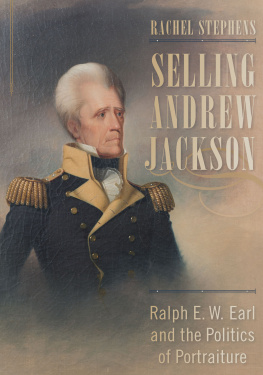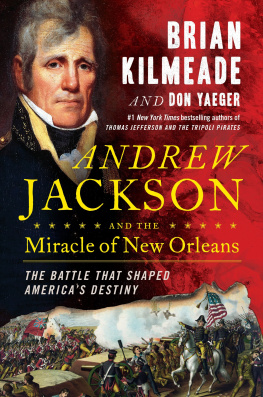
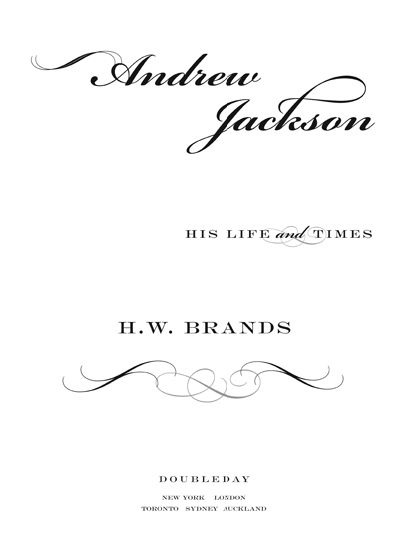


J ohn Quincy Adams had seen this day coming for years. His only consolation was that he had helped postpone it till now. The son of the man he considered most responsible for American independence, Adams felt a peculiar responsibility for the outcome of the republican experiment. And these last few years the experiment hadnt been turning out well at all. His father, John Adams, and most of the other Founders had feared that republicanism would degenerate into democracy: that government of the people would become government by the people. Nothing in history disposed them to look hopefully on such a development, for never in history had ordinary people run their own affairs without very quickly running them into the ground. The elder Adams linked arms after the Revolution with those who sought to curb the popular excesses of the revolutionary era; at Philadelphia in 1787 they wrote a constitution that took power from the states and conferred it on the central government, and in doing so diminished the influence of the people in politics generally. As vice president and then president, John Adams continued to work to keep power out of the hands of the unlettered and incompetent, and in the hands of those best suited by education and experience to exercise it responsibly.
But it was a losing cause. A first setback occurred when Thomas Jefferson defeated John Adams for president. Jefferson was more the aristocrat than Adams, as anyone who compared Monticello, where Jeffersons slaves worked their masters plantation, with the Adams home in Massachusetts, where Adams himself tilled his modest garden, could see at once. But Jefferson cast himself as the tribune of the people, and he carried the day. James Madison was hardly less elegant than Jefferson, but he, too, posed as the defender of the many against the few. By the end of Madisons presidency the formula had been perfected, and James Monroe, yet another Virginia planter, entered the executive mansion almost unopposed.
John Quincy Adams watched and learned. He noted, among other things, that being secretary of state gave a man a large head start toward the presidency. Jefferson had been secretary of state before becoming president; so also Madison and Monroe. Consequently when Monroe offered to make Adams his secretary of state, the offer included a presumption of the presidency thereafter, and Adams gladly accepted.
Yet even while he did his time as a diplomat, the political climate continued to shift. Like an autumn storm that rose in the West and gathered strength as it approached the Atlantic, the wind of democracy began to blow in the valleys of the Ohio and Mississippi and gained force on its way east. New states entered the Union with few restrictions on the vote, and their example caused the old states to change their own rules. Equally alarming to thoselike Adamswho counted on the restraining effect of representation, the states began to allow voters, rather than the state legislatures, to choose presidential electors. Campaigns for president became popularity contests. The highest office in the land went to the favorite of the lower classes.
Adams escaped the early gusts, winning the presidency in 1824 by luck and political art. But during his four years as president he often wished he hadnt won, so abusive was his treatment at the hands of those who claimed to speak for the people. And nowon the morning of March 4, 1829he prepared to deliver the presidency to the man the people, in all their ignorant majesty, had chosen.
T he morning of Adamss defeat should have been the morning of Andrew Jacksons greatest triumph. And in some ways it was. Everything Adams deplored about the direction of American politics, Jackson applauded. To Jackson, the current contest in America was simply the latest stage of the historic struggle against privilege that ran back to the Magna Carta and included the Protestant Reformation of the sixteenth century, the English Revolution of the seventeenth, and the American Revolution of the eighteenth. At each stage the people seized more of what by right belonged to them, from those who intended that power remain the monopoly of the few. Finally, for the first time in American history, and for one of the very few times in human history, the people had chosen one of their own to govern them. And now they were to install him in the highest office in the land. A man would have been dead to noble emotion not to feel the power and meaning of the moment.
Jackson felt it alland much besides. The thousands of farmers, mechanics, and crossroads merchants who had come to Washington City to inaugurate him, and the hundreds of thousands of their brethren who had voted for him, could almost taste the fruits of their heros triumph, but Jackson alone knew what the victory had cost him. He had been fighting for the peoples right to direct their own affairs since the Revolutionary War, when, as a mere boy, he took up arms against Britain. A gash to the head from a British sword left him with a permanent crease in his skull and an abiding hostility to all things British; smallpox contracted in a British prison marked the beginning of a lifetime of compromised health. The war also cost him his mother and brothers (his father had died before his birth), throwing him orphaned upon a turbulent, threatening world.
As a young man he entered politics in Tennessee. He battled the antidemocratic forces in the state and the nation, going so far as to challenge George Washington when the father of his country adopted what Jackson took to be excessive airs. His audacity on behalf of the people earned him enemies who slandered him and defamed even his wife, Rachel. He dueled in her defense and his own, suffering grievous wounds that left him with bullet fragments lodged about his body.
When the British again threatened American autonomy, by provoking Indian attacks in the West and seizing ships and sailors on the Atlantic, Jackson joined his voice to those of others demanding war in defense of American security and rights. When the war came, he led an offensive against the Indians and, upon its success, took charge of the defense of the Mississippi against Britains attempt to sever the United States along the line of the great river. At New Orleans in 1815 he threw the redcoats back, to their astonishment and that of most of his compatriots. The victory won him the adulation of the American people, who hailed him as a second Washington, but the campaign added to the ranks of his political enemies, who carped at his boldness and his impatience with the forms of military command.
The second war against Britain made clear to many Americans something Jackson had sensed from the first: that the struggle for American popular rights was of a piece with the struggle for North America itself. The opponents of popular rights had filled the ranks of the Loyalists during the first war against Britain; the same opponents, or their heirs, had been conspicuously apathetic, in some cases seditious, during the second British war. Jacksons victory at New Orleans didnt end the British threat; the British still held Canada, and their ally Spain occupied Florida and Mexico. As long as these foes hovered about Americas borders, the American experiment in self-government remained in peril. And while it did, Jackson couldnt rest.
Next page

